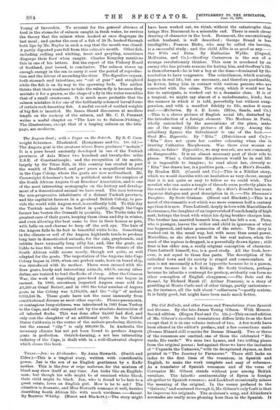TALES.—Jan : an Afrikander. By Anna. Howarth. (Smith and Elder.)—This
is a tragical story, written with considerable power. Jan is the son of an English gentleman by a Kafir mother. This is the fons et origo ma/orum, for the mixture of blood may show itself at any time. Jan looks like an English- man ; but though his wife might be of unmixed white blood, their child might be black. Jan, who is found to be heir to a great estate, loves an English girl. How is he to act ? The situation is dramatic, and Miss Howarth manages it well, besides describing South African life with much vividness.—Sunset. By Beatrice Whitby. (Hurst and Blackett.)—The story might
have been worked out, we think, without the catastrophe that brings Mrs. Beaumont to a miserable end. There is much clever drawing of character in the book. Beaumont, the unconsciously selfish husband, is well described ; George Brand is less intelligible ; Frances Blake, who may be called the heroine, is a successful study ; and the child Allix is as good as any.-- Our Wills and Fates. By Katherine Wylde. (Osgood, McIlvaine, and Co.)—Geoffrey Carnarvon is the son of a strange revolutionary thinker. This man is murdered by an enemy who has private reasons for hating him, and Geoffrey's life is thenceforward—he is but a boy at the time—dominated by the resolution to have vengeance. The coincidences, which scarcely happen in real life, but are necessary, and therefore pardonable, in fiction, bring him in contact with various persons who are connected with the crime. The story, which it would not be fair to anticipate, is worked out to a dramatic close. It is of a tragical, we might say almost of a melodramatic, kind ; but the manner in which it is told, powerfully but without exag- geration, and with a manifest fidelity to life, makes it seem real.—Mallerton. By A. B. Louis. (Bliss, Sands, and Co.) —This is a clever picture of English social life, disturbed by the introduction of a foreign element. The Moslems in Paris, wholly untouched by the associations of the place, make one of the many lifelike pictures of the story. Among the subsidiary figures the Salvationist is one of the best.— Good Mrs. Hypocrite. By " Rita." (Hutchinson and Co.)— " Rita " does not spare her sombre colouring when she is drawing Catharine Macpherson. Was there ever woman so odious, so false ? Hypocrites, we may remark, are not commonly so disagreeable. It is an almost necessary part of their redo to please. What a Catharine Macpherson would be in real life it is impossible to imagine ; to read about her, cleverly as " Rita" has drawn her, is a positive pain.—By a Hair's Breadth. By Headon Hill. (Cassell and Co.)—This is a Nihilist story, which we would describe without hesitation as very clever, except that it is not quite as easy to follow as we could wish. The novelist who can make a tangle of threads seem perfectly plain to the reader is the master of his art. By a Hair's Breadth has some vigorous dialogue and good description in it.—The Showman's Daughter. By Scott Graham. (Hurst and Blackett.)—This is a novel of the romantic sort which was more common half a century ago than it is now. Piers Luttrell, deeply in love with Marcelline de Kerbrennec, the daughter of an impoverished French family of high rank, betrays the trust with which his dying brother charges him. The brother has married beneath him, and has left a son. Piers, who is younger, leaves the widow and child in ignorance of what has happened, and takes possession of the estate. The story is worked out in the usual way, but with more than usual power. Marcelline, as she shows herself in her real nature, when the mask of the ingenue is dropped, is a powerfully drawn figure ; still finer is her elder son, a really original conception of character. Piers Luttrell himself, too, is a good study. All the book, how- ever, is not equal to these fine parts. The description of the cathedral town and its society is stupid and commonplace. A man is not necessarily a fool or hypocrite because be is a parson, or even because he is a Bishop. Mr. Scott Graham, perhaps because he inherits a contempt for prelacy, evidently can form no other conception of English clergymen.—The Dale and the Damsel, by Richard Marsh (C. Arthur Pearson), is a story of gambling at Monte Carlo and of other things, partly caricature— as, for instance, all the talk about " collesteera "—partly serious. It is fairly good, but might have been made much better.


















































 Previous page
Previous page